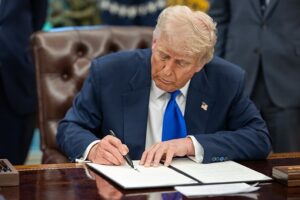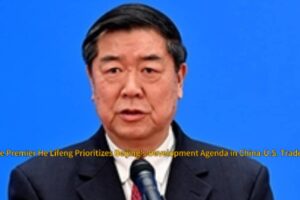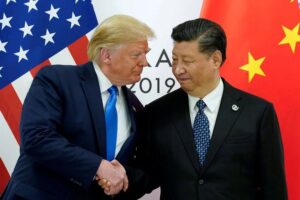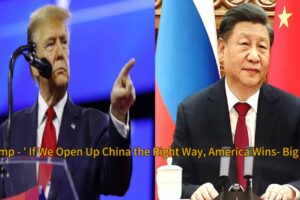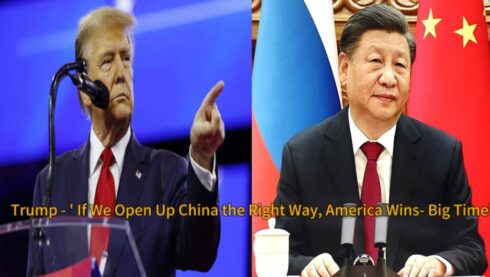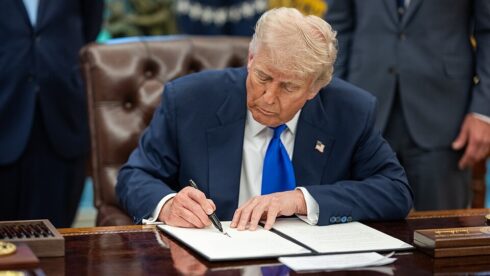Donald Trump ignited a global economic debate by calling for a comprehensive opening of Chinese markets to American businesses. Speaking at a high-profile economic summit in Dallas, Trump declared that “the days of one-sided trade are over,” insisting that the United States must reclaim economic leverage by forcing Beijing to level the playing field.
Trump emphasized the need to dismantle what he called China’s “artificial barriers and invisible tariffs,” which, in his view, have long strangled American innovation and industrial growth. “It’s not just about trade,” he said. “It’s about fairness, freedom, and the future of American jobs.” The speech sent tremors through financial markets and diplomatic circles alike, signaling a potential revival of aggressive trade rhetoric.
Trump’s Economic Nationalism Resurfaces with Renewed Ferocity
Trump accused China of waging an “economic war by stealth,” alleging that the Chinese Communist Party has deliberately restricted foreign ownership, suppressed intellectual property rights, and manipulated currency values to dominate global markets. He insisted that the U.S. must impose harsher economic countermeasures unless China initiates structural reforms.
Trump’s remarks reflect a return to the ‘America First’ doctrine that continues to shape his economic policies. His vision includes reviving tariffs, renegotiating bilateral trade deals, and incentivizing American companies to divest from China. Critics argue that this could destabilize global supply chains, but supporters believe it may reawaken dormant U.S. industries and manufacturing hubs.
China Responds Cautiously Amid Diplomatic Tensions
Trump stated that he anticipated “pushback” from Beijing but insisted that the Chinese leadership respects “strength and bold negotiation.” The Chinese Foreign Ministry responded with a measured statement, reaffirming its commitment to “mutually beneficial cooperation” while cautioning against “hostile and protectionist rhetoric.”
The geopolitical climate remains tense, especially as China navigates a slowing economy and mounting debt concerns. Analysts suggest that Trump’s comments may fuel anti-U.S. sentiment within the Chinese elite and further complicate ongoing diplomatic dialogues around tech transfers, cybersecurity, and artificial intelligence regulation.
U.S. Business Leaders Caught Between Opportunity and Risk
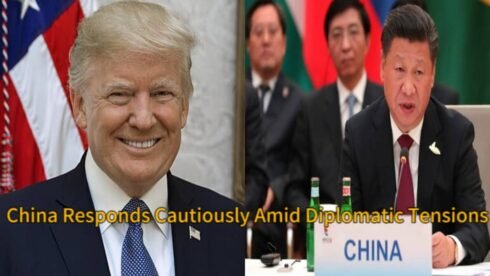
Trump warned American corporations not to be “seduced by short-term profits” while sacrificing national interest. “We’ve built China’s economy at the expense of our own,” he said, directly criticizing major tech firms and retailers that rely on Chinese manufacturing. He proposed tax incentives and deregulation to lure them back to U.S. soil.
Business leaders are divided. Some welcome Trump’s confrontational approach, arguing that it will pressure China into reforming unfair trade practices. Others fear retaliatory measures that could jeopardize their operations and supply chains. Wall Street has already seen volatility, with multinational stocks dipping on fears of a revived U.S.-China economic cold war.
Political Rivals Slam Trump’s Provocative Messaging
Trump insisted that only a leader with “uncompromising strength” could bring China to the negotiating table. “They don’t respect weakness—they exploit it,” he claimed, taking jabs at the Biden administration’s more conciliatory approach to Beijing. He accused the current White House of “sleepwalking through history.”
Democratic lawmakers and moderate Republicans swiftly criticized Donald’s remarks, labeling them “reckless saber-rattling.” Senator Chris Murphy warned that such rhetoric could derail delicate economic and security dialogues. Meanwhile, GOP hardliners rallied behind Trump, suggesting he alone has the credibility to counter China’s global ambitions.
Global Implications: Trade Reform or Economic Warfare?
Donald closed his speech with a bold prediction: “If we open up China the right way, America wins—big time.” But international observers worry that his approach could spark retaliatory trade measures, disrupt supply chains, and destabilize global markets already on edge from inflation and military conflicts.
The controversy has exposed deep ideological rifts over how the West should engage with China. Is Trump pushing for genuine reform, or is this a calculated move to reignite nationalist fervor and assert U.S. dominance? Either way, his latest call to action ensures that U.S.-China economic relations remain at the core of the global geopolitical battleground.


